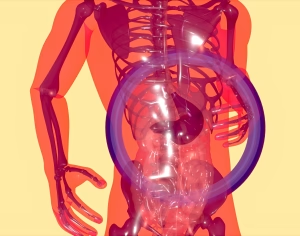Pain
Acupuncture for Stomach Pain

We have all experienced stomach pain. Either we ate something wrong, a medication we took had side effects, it might related to one’s menstrual cycle, and/or be simply chronic digestive issues that have some genetic component. How do we treat this with acupuncture and Chinese medicine?
First, per usual, we must identify the correct pattern.
If someone suffers from chronic constipation and bloating, we can assume the pattern is one of “food stagnation,” which can be corroborated by a dense sensation in the middle finger position of the right radial artery—also by palpating the epigastric region for tenderness. These patients tend to feel overheated, they might experience excessive thirst, insomnia, or irritability, all as a result of the intestinal inflammation. Whether or not there is distention alters the diagnosis.
We can needle points along the stomach and large intestine vessels to move gases out and downward. Depending on the rest of the pattern, we might also use the pancreas or even lung vessels to transfer mitochondria to the former organ vessels, the way one might money from their savings to their checking account, as needed. Herbal formulas indicated tend to revolve around rhubarb root, possibly lily-turf, gypsum stone, or white peony, the latter of which can be especially adept at treating all forms of cramping in the body.
From a western medical perspective, these are patients who might benefit from intermittent fasting and/or a magnesium supplement.
More commonly, stomach pain has to do with our blood. Either it is not moving or not arriving to the local area, leaving the smooth muscles of the organs dehydrated, sent into spasm in search of fluids, but we experience it as, Ouch. My tummy hurts.
In a pattern of “blood stagnation,” acupuncture works exceptionally well. We can use points along the pancreatic or liver vessels to encourage healthy blood movement. We might also use local points around the abdomen—where everyone always wants us to put it—to encourage local vasodilation and the dissolution of amenable masses. Useful herbal families might revolve again around white peony or rhubarb, but also apricot kernel, corydalis, or safflower. Generally, the veins beneath the patient’s tongue will be distended and purple enough to corroborate diagnosis.
Lastly, is blood deficiency, which might be slightly less amenable to acupuncture—more so to moxibustion, herbal medicine, the consumption of red meat, and healthy sleep hygiene. Moxibustion is often more effective at generating mitochondria and healthy fluids than acupuncture. Herbs we might consider are rehmannia, angelica, or even red dates, the latter of which has the added benefit to settle heart palpitations and anxiety.
Since 2 of the 3 physiological patterns for stomach pain pertain to the blood, it is quite common to be menstrual and/or hormonal related. Some patients for whom it is impractical to come every single week can benefit from coming at least just twice a month, the week before and after their cycle begins.
Five Transformative Health Benefits Acupuncture Provides for Overall Health

As more insurance plans and more allied health practitioners begin to embrace what has traditionally been known as “alternative medicine” treatments, acupuncture has enjoyed a surge in popularity with potential patients desperate for a drug-free alternative for their overall health and wellness.
Acupuncture, an ancient practice rooted in Traditional Chinese Medicine (TCM), has been gaining traction in modern healthcare as a holistic approach to promoting physical, emotional, and mental wellbeing. While skeptics may question its efficacy, a growing body of scientific research supports acupuncture’s myriad health benefits. From pain relief to stress reduction, this time-honored therapy offers a natural and effective way to enhance overall health. continue reading
Finding Relief: The Benefits of Acupuncture for Treating Chronic Pain

According to a study published in 2023, approximately 51 million people in the United States suffer from chronic pain, with about 17 million of those suffering from high-impact chronic pain. Those who suffer from chronic pain find their lives altered in difficult ways. The search for relief is constant. Traditional medicine offers various prescription medications, but if you are looking for a more natural path to healing and wellness, acupuncture should be at the top of your list. continue reading
Tom Brady & Nightshade Vegetables

If he isn’t universally considered the greatest football player of all time, he’s at least objectively the most successful. Supposedly, one of Tom Brady’s secrets to success was an extremely strict diet, which was about 80% plant-based, organic, paleolithic, with abstinence from sugar, alcohol, soy, condiments, frozen foods, gluten, and nightshade vegetables.
Nightshade vegetables include white potatoes, tomatoes, eggplants, and bell peppers, and although all of these contain nutrients, they also contain a compound called solanine, a natural pesticide that can be toxic in high concentrations. People with irritable bowel, autoimmune, and/or arthritic conditions can be more vulnerable to solanine’s adverse effects—in Chinese medical terms, it creates dampness, or inflammation in the gut, which gets sent “outwards” to our joints. As someone who has battled gout disease off and on for twenty years, I’ve recently decided to experiment with nightshade abstinence. When it comes to self-experimentation, I generally recommend and adhere to the rule of the life cycle of a red blood cell, which is 120 days, or about four months, so I’ll let you know how things are when I reach the finish line.
Potatoes are an easy workaround, since sweet potatoes are safe, not to mention healthier overall, and delicious. I’ll miss French fries, but I’m an adult, and let’s be honest, they’re probably one of the worst things we can possibly eat. Eggplant and peppers are generally easy to avoid, but tomatoes will be tough. I love sauce and meatballs, not to mention a good caprese salad as we approach the season, however I do not love any of these things as much as I do my internal organs. Potential workarounds in said Italian realm are sauceless meatballs (+olive oil), pesto sauces, or garlic and oil primaveras, the latter of which sans peppers of course.
In playing with diet, I’ve found the same benefit I once did when imposing creative restrictions on myself as a comedian many years ago. For example, at one point I chose to not do or write any jokes about race anymore, simply because they’d become so ubiquitous and hacky on the circuit. I got so bored of hearing them that I couldn’t bring myself to perpetuate the problem, no matter how unique I thought a particular idea of mine was. By “censoring” myself in this way I think I became a superior writer, forced to think harder and write more imaginatively. Similarly, when we omit certain foods from our diet, we might be forced to broaden our horizons (just use Google!), expand our minds and at-home menus, and probably discover new foods that we love, and more importantly love us in return.
If you suffer from any chronic joint pain, autoimmune, or intestinal condition I would invite you to join in my self-experiment and see how your body feels. You/we don’t have to commit to forever. Just four months to intelligently reassess. If you prefer to wait until after tomato season you can enjoy throughout the summer, begin after Labor Day, and resume nightshade indulgences again for the winter holidays. As humans go, it seems the second most common time of year to clean up our acts after New Year’s is the end of summer, in the wake of vacations, ballgames, beers, and barbeques.
None of us can become Tom Brady on the football field, but it would be nice if our internal organs and systems could be as close as possible to the Tom Brady’s of our bodies. As we weaken with age, I believe the most logical antidote is strength in discipline, in hopes of maximizing physical freedom through restrictions or subtraction. Less is more, as they say, a fine maxim to default to under the spell of American food.
Unlocking the Ancient Wisdom of Gua Sha

Gua sha is rooted in traditional Chinese medicine. Practitioners of this medicine believe that a person’s qi, or energy, must flow unhindered throughout the body so you can feel your best. When qi becomes stagnant, health problems occur. With Gua sha, your acupuncturist uses a smooth-edged tool to gently scrape areas of your body where inflammation or stagnant qi exist to help improve circulation and promote healing. When done correctly, Gua sha can help you unlock radiant skin and achieve holistic well-being. continue reading


